Oliver Twist (1922)

British postcard presented with The Penny Magazine. Photo: First National. Jackie Coogan in Oliver Twist (Frank Lloyd, 1922). “Please, sir, I want some more”.
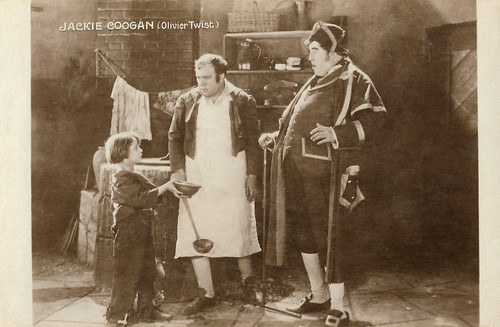
French postcard by Cinémagazine-Edition. Photo: Jackie Coogan in Oliver Twist (Frank Lloyd, 1922).

German postcard by Ross Verlag, Berlin, no. 715/1. Photo: Transocean-Film-Co., Berlin. Jackie Coogan in Oliver Twist (Frank Lloyd, 1922).

German postcard by Ross Verlag, Berlin, no. 725/2. Photo: Transocean-Film Co., Berlin. Jackie Coogan in Oliver Twist (Frank Lloyd, 1922).
In Oliver Twist (Frank Lloyd, 1922), Jackie Coogan plays Charles Dickens' beloved orphan named Oliver Twist. Oliver's mother, a penniless outcast, died giving birth to him. As a young boy, Oliver is brought up in a workhouse, is deemed a troublemaker, and sent away to apprentice to an undertaker, Mr. Sowerberry (Nelson McDowell).
Then Oliver meets a pickpocket, Edouard Trebaol as The Artful Dodger, on the streets of London. From there, he joins a household of boys who are trained to steal for their master (Lon Chaney as Fagin). Oliver also meets a burglar named Bill Sykes (George Siegmann) and a prostitute named Nancy (Gladys Brockwell). After realizing that his new friends are on the wrong side of the law, Oliver spends the rest of the film trying to escape them, all the while, his mysterious past is threatening to come to light…
Producer Sol Lesser of First National Pictures and the Coogan family correctly saw Charles Dickens' classic story as an excellent vehicle for their young star, who adds a touch of his own personality to the character. Lon Chaney had built his reputation as a villain and a master of makeup. Director Frank Lloyd had already successfully tackled Dickens in the Fox prestige production of A Tale of Two Cities. Jackie Coogan, Lon Chaney, and Frank Lloyd all get the job done. Once feared lost, a print was reportedly discovered in Yugoslavia in 1973. The print lacked intertitles, which were subsequently restored by Blackhawk Films with the help of Jackie Coogan and Sol Lesser.
Lugonian at IMDb: "many of the film's best moments belong to little Jackie. It's certainly hard to forget his sad facial emotions capturing the essence of Dickens's character, particularly one who's never experienced happiness. Even in a courtroom scene where the accused thief is forced to stand on a platform as he fights dizziness and keeping his eyes open to what's happening around him, brings forth emotional pity, though not by his stern judges.
Only when taken in by the wealthy Mr. Brownlow is he given that opportunity to find the true meaning of happiness and consider himself one of the family. Being abducted back to the gang of thieves who strip him of his luxury clothing and revert him back to his former pauper-looking appearance is quite an emotional impact for little Oliver, especially when in the clutches of the likes of Bill Sykes. No wonder Coogan became the most popular child actor of his time."

German postcard by Ross Verlag, no. 670/1, 1919-1924. Photo: Transocean-Film-Co., Berlin. Jackie Coogan as Oliver and Gertrude Claire as Mrs. Maylie in Oliver Twist (Frank Lloyd, 1922).
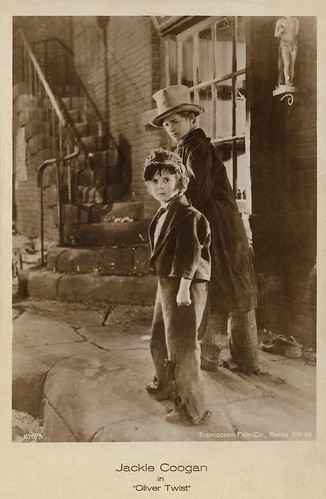
German postcard by Ross Verlag, no. 670/3, 1919-1924. Photo: Transocean Film-Co., Berlin. Jackie Coogan as Oliver and Edouard Trebaol as The Artful Dodger in Oliver Twist (Frank Lloyd, 1922).

German postcard by Ross Verlag, no. 670/5, 1919-1924. Photo: Transocean Film-Verleih. Jackie Coogan in Oliver Twist (Frank Lloyd, 1922). On the left, Edouard Trebaol as The Artful Dodger.

German postcard by Ross Verlag, Berlin, no. 670/6. Photo: Transocean-Film-Co., Berlin. Jackie Coogan in Oliver Twist (Frank Lloyd, 1922). The stout man on the right must be George Siegmann playing Bill Sykes.
Daddy (1923)

German postcard by Ross Verlag, no. 668/1, 1919-1924. Photo: Transocean Film-Co., Berlin. Jackie Coogan in Daddy (E. Mason Hopper, 1923) with Anna Townsend and Bert Woodruff.

German postcard by Ross Verlag, Berlin, no. 668/2. Photo: Transocean-Film-Co., Berlin. Jackie Coogan and Cesare Gravina in Daddy (E. Mason Hopper, 1923).

German postcard by Ross Verlag, Berlin, no. 668/4. Photo: Transocean-Film-Co., Berlin. Jackie Coogan and Cesare Gravina in Daddy (E. Mason Hopper, 1923).

German postcard by Ross Verlag, Berlin, no. 668/5. Photo: Transocean-Film-Co., Berlin. Jackie Coogan and Cesare Gravina in Daddy (E. Mason Hopper, 1923).

German postcard by Ross Verlag, Berlin, no. 668/6. Photo: Transocean-Film-Co., Berlin. Jackie Coogan and Cesare Gravina in Daddy (E. Mason Hopper, 1923).
Jackie Coogan's parents, Jack and Lillian Coogan, wrote the script for the silent drama Daddy (E. Mason Hopper, 1923) for Associated First National Pictures. In fact, Daddy was a family affair, it was "A Jackie Coogan Production," "personally supervised by Jack Coogan".
Jackie plays the son of a poor violin teacher (Arthur Edmund Carewe) who is separated from his father when his parents break up their marriage. Believing her husband to be unfaithful, Helene Savelli (Josie Sedgwick) takes her little son Jackie (Coogan) to live on the Holden farm. Helene dies shortly thereafter and Jackie runs away from home when the Holdens (Bert Woodruff and Anna Townsend) are forced into the poorhouse. In the Big City, Jackie befriends Gallo (Cesare Gravina), a sidewalk musician who just happens to be the former teacher of world-famous violinist Paul Savelli, Jackie's long-lost father. Before he dies, Gallo manages not only to reunite father and son but restore the farm to the kindhearted Holdens.
Daddy was a commercial and critical success. It was the 5th highest-grossing American film of 1923 at the box office after Safety Last!.
The Daily Independent of Murphysboro, Illinois praised the full cast, believing Hopper's "directorial genius" to have brought out the best in everybody. They stated that Coogan possessed an "undiminished power" as a star which "draw[s] to him all classes and ages and both sexes".
The Daily Courier of Connellsville, Pennsylvania stated that the film is "richer in opportunities than any previous Jackie Coogan vehicle and reported that spectators at the theatres were "thrilled to hushed silence when little Jackie moved through the scene in which his guardian passes away and Jackie finds his real daddy". The newspaper declared that the film will "live in our memory forever".

German postcard by Ross Verlag, Berlin, no. 668/8. Photo: Transocean-Film-Co., Berlin. Jackie Coogan and Arthur Edmund Carewe in Daddy (E. Mason Hopper, 1923).
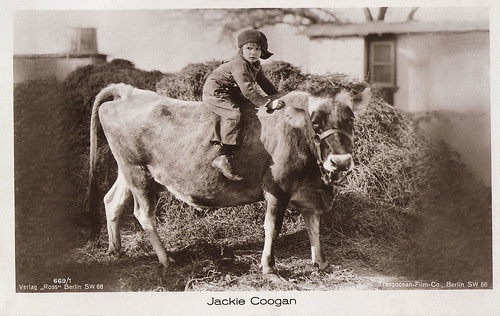
German postcard by Ross Verlag, no. 669/1, 1919-1924. Photo: Transocean-Film-Co., Berlin. Jackie Coogan in Daddy (1923).

German postcard by Ross Verlag, Berlin, no. 669/2. Photo: Transocean Film-Co., Berlin. Jackie Coogan in Daddy (E. Mason Hopper, 1923).

German postcard by Ross Verlag, Berlin, no. 669/3. Photo: Transocean Film-Co., Berlin. Jackie Coogan in Daddy (E. Mason Hopper, 1923).
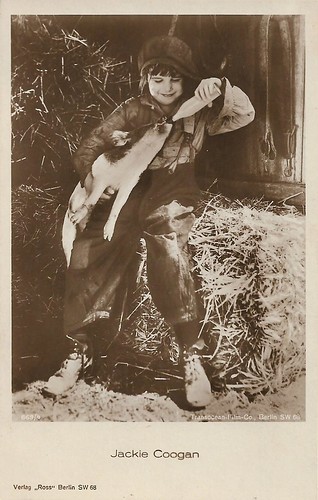
German postcard by Ross Verlag, Berlin, no. 669/4. Photo: Transocean-Film-Co., Berlin. Jackie Coogan and his pet piglet in Daddy (E. Mason Hopper, 1923).

German postcard by Ross Verlag, Berlin, no. 669/5. Photo: Transocean Film-Co., Berlin. Jackie Coogan in Daddy (E. Mason Hopper, 1923).

German postcard by Ross Verlag, Berlin, no. 669/6. Photo: Transocean Film Co., Berlin. Jackie Coogan in Daddy (E. Mason Hopper, 1923). Postcard sent in the former Kingdom of Serbs, Croats, and Slovenes (Yugoslavia).

German postcard by Ross Verlag, Berlin, no. 701/3. Photo: Transocean-Film-Co., Berlin. Jackie Coogan in Daddy (E. Mason Hopper, 1923).

German postcard by Ross Verlag, no. 701/4. Photo: Transocean-Film-Co., Berlin. Jackie Coogan possibly in Daddy (E. Mason Hopper, 1923).
A Boy of Flanders (1924)

French postcard by Cinémagazine-Editions. Photo: DIX, Paris.

German postcard by Ross Verlag, no. 680/1, 1919-1924. Photo: Bafag / MGM. Jackie Coogan in A Boy of Flanders (Victor Schertzinger, MGM 1924), based on the novel by Ouida. The girl is Jeanne "Jean" Carpenter, who plays Alios Cogez, while the woman may be Nell Craig, who plays her mother, Marie Cogez.

German postcard by Ross Verlag, no. 680/2, 1919-1924. Photo: Transocean-Film-Co., Berlin. Jackie Coogan in A Boy of Flanders (Victor Schertzinger, 1924).
The American drama A Boy of Flanders (Victor Schertzinger, 1924) is the second adaptation of the novel 'A Dog of Flanders' published in 1872 by the British author Ouida. The script was written by Max Abramson. The first adaptation was A Dog of Flanders (Howell Hansel, 1914) with Marguerite Snow as Nello.
The film was conceived as a vehicle for the young star, Jackie Coogan, who had starred successfully in Charlie Chaplin's The Kid (1921) followed by My Boy (Victor Heerman, Albert Austin, 1921), Oliver Twist (Frank Lloyd, 1922) and Daddy (E. Mason Hopper, 1923). Coogan was the first child actor to play the leading role in this story. In the first version of 1914, the role had been entrusted to an actress.
The prominence given to the young star is also immediately apparent in the change of title from the original 'A Dog of Flanders' to 'A Boy of Flanders'. For the role of the dog, however, a superstar was chosen, Teddy the Dog ("Keystone Teddy, the Wonder Dog"), a canine celebrity of Hollywood cinema at the time, who had already starred in numerous short films, but also in successful films such as Stella Maris (Marshall Neilan, 1918) with Mary Pickford.
When his mother and grandfather die, Nello is left to be an orphan boy in the village of St Agnes. His only friend is Alois Cogez (Jeanne Carpenter), the daughter of the richest man in the village. Nello is sent away by her father (Lionel Belmore) and befriends the dog Patrasche. When Cogez's barn burns down, Nello is blamed. The villagers are about to send him to the orphanage when the famous painter Jan van Dullen arrives in the village.
Jan van Dullen (Josef Swickard) awards a prize for the best children's drawing. Because Nello's drawing is overlooked, another child wins the contest. Later, when Van Dullen notices the drawing, he goes looking for the boy during a snowstorm. Patrasche helps to find Nello, who is dying.
As in the 1914 version, A Boy of Flanders is given a happy ending, where the original story ended with the death of the boy and the dog. Eventually, Cogez decides to take the boy under his wing. In this way, Coogan can once again play his usual role of a poor orphan child who eventually finds happiness and a new family.

German postcard by Ross Verlag, Berlin, no. 816/1. Photo: Bafag / MGM. Jackie Coogan in A Boy of Flanders (Victor Schertzinger, 1924), based on the novel by Ouida.
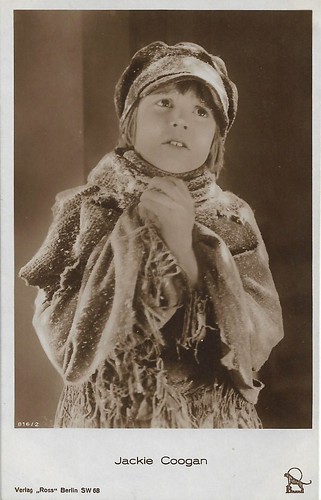
German postcard by Ross Verlag, Berlin, no. 816/2. Photo: Bafag / MGM. Jackie Coogan in A Boy of Flanders (Victor Schertzinger, 1924), based on the novel by Ouida.

Hungarian postcard by FMSI, no. 84. Photo: Mûvèsz Film. In 1924 Coogan visited Budapest during his grand European tour. The photo refers to Coogan's outfit in A Boy of Flanders (Victor Schertzinger, 1924). Mûvèsz Film may have been the Hungarian distributor of that film.
Sources: Hans J. Wollstein (AllMovie), Movies Silently, Lugonian (IMDb), Wikipedia, and IMDb.
No comments:
Post a Comment